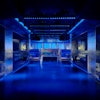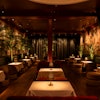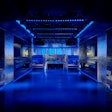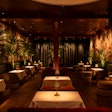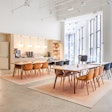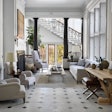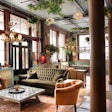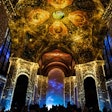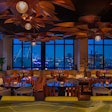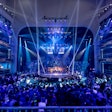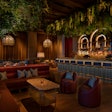
Staying hip for 20 years is tough. And running a successful special event business during that time, adapting to changes in taste and the economy, and retaining top-notch clients--that's something to envy, especially as the industry looks to an uncertain future following the September 11 attacks.
That makes event designer Robert Isabell someone worth listening to. New Yorkers have been looking at his grand, stunning work for years. Isabell started his company in 1980 with customers including Bergdorf Goodman and Giorgio Armani, and over the years his clients have included Blaine Trump, Anna Wintour, Tina Brown, PaineWebber and a Miller sister or two (you'd expect him to be a great source of gossip—but you'd have to wrangle it out of him). His firm's capabilities have expanded, too, from working with flowers to building furniture and creating lighting designs. Today, Isabell says he does around 300 events a year. About 50 percent are social and private events; 20 percent are fashion events; and 30 percent are corporate events and fund-raisers, like April's Costume Institute gala, inspired by the style of the late Jackie Kennedy, his friend and frequent client.
We sat down with Isabell last month, just a few days before the World Trade Center attacks changed the face of New York and its special events industry. At the time, Isabell was preparing for a blockbuster series of events: the sanctuary consecration at the restored Central Synagogue on September 9; the after-party for Marc Jacobs' fashion show on September 10—at the time, predicted to be one of Fashion Week's biggest bashes--and the New York City Opera opening night gala on September 11.
The opera event didn't go on, of course. But in the time following the attacks, Isabell has become an even more relevant profile subject. While weathering changes in the economy over the years, he has held onto some clients for more than 20 years. And as many people speculate about how special events' tone and style will change, looking back through his eyes may be instructive.
While about 75 workers (most of them full-time employees) constructed furniture for the Jacobs party, Isabell sat in his studio in the meatpacking district and shared some insights into keeping customers happy: Provide consistent, dependable service. Adapt to the times. And make sure to remember the purpose of every event.
How has your client base changed?
My client base—a lot of them are still my clients today. It's just expanded into a much more detail-oriented business. And we do everything now, from building furniture for events—for example, for the Marc Jacobs show we'll be using very simple flowers, just gardenias every place, but we'll be building a reflecting pool, all the furniture, bars.
It seems that that sets you apart. A lot of people say they're "full-service," but they don't have a shop like this in the back.
We have a full production shop with welders and carpenters—it's a full-service production facility.
Is it easier or harder to have it all right here?
Easier. That's why it's here.
Because you can control everything?
We have to control everything. Because everything is changed up to the last minute. The design is often changed by the client. And we can figure out finishes for furniture here, or work with fabric.
You have clients who have been with you since you started. What do you give them that keeps them coming back?
Beauty...scale...originality...great design...taste...style.
How have events changed in the past 20 years?
They've just become more and more detail-oriented—not elaborate...In New York, you need to think of a lot more things to keep people excited than you did 15 years ago. People go out every night of the week. Some people go to two or three things a night. They see everything. For them to say, "Oh, it was a great party, it was unusual," takes something exceptional.
How do you keep coming up with concepts that do that?
I don't know.
Where do you find inspiration—travel, reading?
No.
It just pops in your head?
It just pops in my head. Well, every event has a reason. The building or site or venue dictates 50 percent of it. What the event is dictates 25 percent, and the client has ideas and opinions and so do I. But a lot of it is really determined by the event and the venue. It's kind of just common sense a lot of times, and the traffic of the event—is there dinner, or dancing, or a show?
How have decor styles changed during your career?
It was very glittery 20 years ago, with Studio 54. It was very extravagant, overblown. And today it's just become much more refined and a lot more tasteful.
How does that translate into the design—do you use fewer colors, or fewer...
Oh, no, nothing about colors. Just the flow of the evening, and what people expect. You have to give them very good food. It's not just a Studio 54 party. In the 70's or 80's it was much easier to throw a big bash. You didn't have to feed people, and they'd go out late and stay out late. Now it's...changed.
How so?
If it's a fund-raiser for a charity, people want to be home by 11. So you have a very small window of time. And events have become much more oriented around dinner and charities.
How have you weathered the changes in the economy?
It never affected my business. We've been busy for 20 years now.
Because of who your private clients are—people who are less affected by such changes?
It doesn't affect too many of my personal clients. And corporations still have to promote and do marketing. Sometimes in a bad economy, my business has actually gotten better. If people are going to spend money, they want to make sure the job is going to be done right. They're going to go to somebody more professional. In good economic times, a lot of people go into business. And when the economy slows down, they don't go out of the business, but they probably close their business and go to work for somebody else. The last time there was a recession I actually got busier.
What do you think people expect when they hear that you're designing an event? Do you think you have a style or trademark?
Every event is different.
But could someone walk into an event and immediately recognize your style?
There are certain things that no one else is going to do. Some people can walk in and know that I did it right away.
Why?
The way things are done. The imagination. It's something that they know.
How important is decor to the overall success of an event?
It all has an equation. If the space is drab, and not exciting, you need more decor. A great space needs less decor, because the architectural elements have already accentuated it. But then you might have to light it differently so that it feels new. In New York, everybody's seen every space a million times. So you need to make it fresh each time, and make it appropriate to the event, and make sure people have a great evening.


